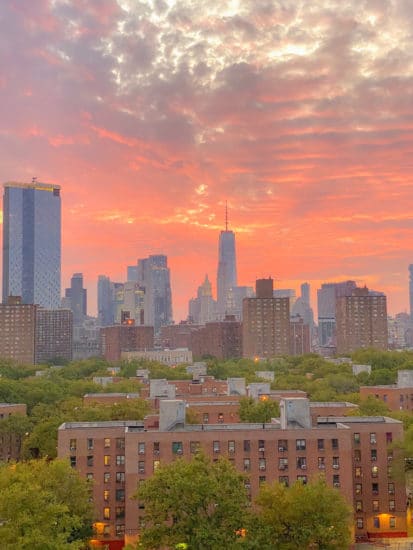When Billy and I began apartment searching in NYC, I was dead set on finding the perfect apartment. A place that was huge, had a walk-in closet and a balcony. We were staying at my family’s place in Connecticut so we would come into the city and spend our days going from building to building, only taking quick stops to eat. Each apartment we saw seemed to be smaller than the previous one, and eventually they all blurred together. Our hotel stays were adding up, and we were getting discouraged. To be fair, Billy liked a ton of them. Me, on the other hand—not so much. I had complete tunnel vision and if it didn’t have all the things I was looking for, I immediately crossed it off my list.
On our last trip into the city, we walked into an apartment that was being renovated. I was shocked at its size (over 1,000 square feet), and it had everything I was seeking (or so I thought). There was not one, but three walk-in closets, tons of space, and a private terrace with a view of the Chrysler Building. I thought we found our perfect New York City apartment (finally)! Our rent was significantly lower than it would have been prior to Covid which made it feel like we hit the jackpot.
When things started to go wrong.
Billy moved in two weeks before me since he was starting a new job as a real estate agent. I stayed in Connecticut until the day before our furniture arrived from Los Angeles. When my parents and I dropped him off, I noticed a few things that I previously missed. As we walked in, it felt like it was 100 degrees inside, even though it was November. I searched for a way to turn off the heat and realized I couldn’t. The only thing I could do was unplug the radiators, and that didn’t make the slightest difference. After reaching out to the super, we learned that the building essentially controls the heat and AC—not the tenant. Never having lived in NYC, I had no idea this was a thing. Little did I know, it was just the beginning of the issues we would face.
The nightmare continues.
Some of the minor inconveniences were broken tiles in the bathroom that leaked into the wall of our closet, causing water damage (this happened a few times because it wasn’t properly fixed). We also dealt with water damage on our ceiling and walls, which caused the paint to yellow. Then, there was exposed wiring in the closet. Some of the major inconveniences were living in a building where the water would go out regularly and having to go days without any hot water. It got so bad the city came and wrote up violations for having inoperable boilers. We also dealt with bugs that were coming up from the improperly laid floors.
After contacting the building manager and super multiple times and realizing they weren’t going to correct any of these issues, a few neighbors and myself started putting in complaints to 311. Eventually, an inspector came out and wrote up violations in our apartment for pests, water damage, broken plaster, and also mice and roaches in the basement.
And that’s where my story ends because legally I can’t go into anymore detail. I’m also not allowed to disclose the address, building name, or management company. I’ve learned that what we went through is unfortunately not that uncommon in NYC, but that it can be avoided if you know where to look and what to look for.
Searching for a new apartment while avoiding our previous mistakes.
Since Billy is a licensed real estate agent, this past summer he and I looked at a ton of apartments. However, I clearly learned from our previous experience. Before we began, we discussed our budget, and we each came up with a few “must have” apartment features. For him, it was a washer and dryer and being close to his jiu jitsu academy. For me, I wanted condo-level fixtures, central heat and AC, and plenty of closet space. I was willing to compromise on having a “huge” apartment if it meant living in a luxury building with a stellar reputation.
It’s now been five months since we’ve moved and honestly…it’s been perfect. Our new place actually feels like a home and I look forward to returning after a long day out in the city. There’s a gym, a rooftop area with spectacular views, a lounge/media room, and attentive staff. But more importantly, I don’t have to worry about what issue will be waiting for me as soon as I walk in the door.
Below, I’ve outlined a few things I wish I knew prior to moving to NYC. Also, in the next few weeks, I’m going to do a follow up post where Billy is going to answer a ton of questions related to apartment searching in NYC.
Apartment hunting do’s and don’ts.
Don’t focus (only) on the things you want.
Make a list of a few non-negotiable (but reasonable) must-haves. These, of course, should be inline with your budget. For example, if you have a $4,500 budget for a one bedroom, but you’re looking for 1,200 sq ft of space, plus a private balcony, and two walk-in closets that isn’t going to be realistic. When you walk in with a never ending list of requirements, you’re going to set yourself up for disappointment.
View the apartment when it’s not under construction and there’s plenty of sunlight.
The first time we viewed the apartment, it was being renovated and we were told everything would be “brand new.” As we entered, there was a strong smell of paint and the workers were using saws and hammers. We took a quick look around and I saw three walk-in closets which sealed the deal for me. Upon leaving, Billy expressed some doubt and said out of every apartment we saw he liked this one the least. I explained that we had so much stuff and this one was a lot bigger than all the others. We were both over spending 8 hours a day searching, so we agreed on it.
Once we found out we were approved, we jumped in the car and drove to Manhattan from Connecticut so we could take a last look around. By the time we arrived, it was night and there wasn’t a lot of lighting in the apartment, which put us at a disadvantage. We did another quick look around and then went back to our hotel to sign our lease. Later on, when we saw our place in daylight, things looked a lot different.
This sounds crazy, but examine the walls.
One of the aesthetically displeasing things we missed was how the walls were warped. Where the molding met the ceiling, it looked like a wave and unfortunately this wasn’t in just one area; it was throughout our apartment. A few other things we didn’t notice until after our lease was signed was the horrible paint job. Our radiator knobs, peep hole, door handles, and window frames were all painted over or had splattered paint covering them. Had we spent more time in there with better lighting, we wouldn’t have missed these things.
Ask if there’s a garbage disposal.
Every apartment I rented in Los Angeles came equipped with a garbage disposal, so I assumed this apartment wouldn’t be any different. After we moved in, I discovered that not only did we not have one, but that they’re actually rare in New York City apartments. This wasn’t a big deal, but for someone who loves to cook and was accustomed to having one, it was a bit of a disappointment.
Research your prospective landlord and/or management company.
New York City has really good landlords but also some terrible ones. Before we signed our lease, I wish I knew about JustFixNYC, 311, DOB, and HPD. Had I done a little research, I wouldn’t have chosen that apartment.
JustFixNYC: Start by entering the address you want information on. From there, you can research your landlord and see if they have any complaints about them. It will then take you to third party sites like HPD and DOB, where you can further investigate. You can also protect yourself from eviction, request repairs, and order a rent history to see if your apartment is rent stabilized.
311: If you keep complaining to your landlord about a specific issue and they’re not addressing it or they’re ignoring it, this is where you go to file a complaint. The city will contact your building and ask them to fix the problem within a specific amount of time. When you fill out the complaint, you can do so anonymously or you can leave your name and number. If you choose to do the latter, the city will reach out to you to see if your issue has been resolved.
Housing Preservation & Development (HPD): This is where you can find the apartments building data. You can view the complaint history, which tells you the date of the complaint, the apartment number, the reason for the complaint, and the location. There’s also relevant information like any litigation open violations, vacate orders, and bed bug reports.
New York Department of Buildings (DOB): Another useful site where you can get a list of all the job filings and complaints against the building, but this one is more to do with construction and maintenance-related issues. You can view the records, permits, inspections, and violations on plumbing, boilers, elevators, and electrical complaints and/or repairs.
Understand NYC heat laws.
Unlike the lack of a garbage disposal, not having the ability to control the temperature was a big deal. As I sifted through apartment listings, I’d see many that said both the heat and AC were included. I assumed that meant what we had in L.A. (and what we have currently). With both apartments, the management company pays for the heat and AC and the tenants pay for the electricity.
When the building pays and controls the temperature, there are specific laws they’re required to follow. Heat season runs from October 1st to May 31st. This means that if the outside temperature falls below 55 degrees between 6am – 10pm, then the indoor temperature has to be at least 68 degrees. At night, regardless of the daytime or nighttime temperature, the indoor temperature has to be at least 62 degrees inside.
Unfortunately, we learned all of this the hard way. The entire time we lived in our first NYC apartment, we never put the heat on, yet in the middle of winter it felt like a sauna. It probably didn’t help that our apartment was on the 20th floor. The units a few floors below ours were probably cold. I’ll never forget watching the snow falling in the middle of January and needing the window AC unit going full blast.
Work with an attentive real estate agent.
Prior to moving to New York, I would walk into a leasing office, meet with the agent, and tour each rental unit. Here, it’s done a lot differently. There are some buildings that have onsite leasing, but many will only allow access to real estate agents (especially condos and co-ops). While Billy and I were looking for our first apartment, we met with about 10 different agents. Some were more helpful than others, but in hindsight, we should have stuck with one or maybe two at the most. Why? Because a good real estate agent gets to know you and understands your needs and wants. When you’re moving from one to the next, you never form that helpful relationship.
If you’re apartment searching in NYC or looking to buy a place, I highly recommend Billy Noorlag. (Full disclosure, he is my boyfriend, but I’m recommending him based on the amount of repeat customers he has, along with witnessing the amount of attention he gives each.) Billy’s an agent at the luxury real estate firm, Nest Seekers International. He does apartment rentals and condo/co-op sales in the New York City area. You can call/text him (323.219.4160), DM him on IG, or reach him by email ([email protected]).




